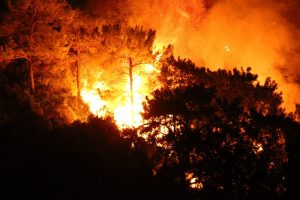
If you place your finger anywhere on the world map, you will find that unprecedented natural disasters are plaguing it. Nature is wreaking havoc on the planet, and people are beginning to ask, “Is it the end of the world?” Gladly, it is. It is the end of the world as we know it, and the beginning of a new, and much better world. The upheavals we are experiencing are labor pangs, and we, the apex of creation, can accelerate and ease the delivery, or make it arduous and painful.
The emergent world is balanced, calm, and all creations in it support one another. It is the opposite of the world we live in now, where “survival of the fittest” is the motto and the weak are exploited ruthlessly. The current world is not like that because nature is inherently careless. Nature is inherently balanced. We, on the other hand, are inherently and infinitely selfish, and being at the top of the pyramid, we determine how everything functions. Because we are selfish to the core, we make the rest of the world function likewise, and the consequences are evidently horrendous.
Because the negative part in us is overwhelmingly dominant, we act without regard for anything, not even for the future of our own children. We are simply insatiable, and no rational explanation will convince us to stop devouring whatever we can, however we can, and the more we degrade others in the process, the better we feel about ourselves. It is just as the Torah writes (Gen. 6:5), “The wickedness of man is great … and all the creations of his heart’s thoughts are only evil all day long.”
Worse yet, Kli Yakar, an extensive 17th century interpretation of the Torah, writes about that verse: “‘All the creations of his heart’s thoughts are only evil all day long’ means that throughout the day, [man’s] lust is insatiable. There is not an hour in the day when he is satisfied. Rather, every hour, he adds more to his lust.” Now that we see who we are, can we expect the world around us not to fall apart?
After more than a century of unhinged exploitation of resources, animals, and people, we’ve come to the end of the world that we’ve known. From here on, we will be forced to build a new world, one that is balanced and caring for all its inhabitants, a society whose motto is not “the survival of the fittest,” but “the survival of the friendliest,” as anthropologist Brian Hare and research scientist Vanessa Woods titled their most recent book.
When we finally come to the realization that we must be like the rest of nature, balanced and caring, we will realize that this is how things have been all along. Hare and Woods, for instance, noted in their book that Darwin’s apparent emphasis on the survival of the fittest is a misinterpretation of his findings. In a quote from Darwin’s Descent of Man, they bring to light a fresh perspective on Darwin’s writing: “Those communities, which included the greatest number of the most sympathetic members, would flourish best and rear the greatest number of offspring.”
We can attribute our reluctance to see how things really work to our ego, which strives to be the sole ruler, but today, this aspiration is a prerogative we cannot afford to take. If we stretch our abusive conduct any further, nature will snap and all of us will pay the price. Not only will natural disasters take their toll on us, but aggression and enmity will grow in every aspect of our lives until we find ourselves embroiled in a third world war where countries use nuclear weapons against each other.
Of course, if this happens, we will have to learn that we have no choice but to change our behavior toward each other. But can we really not learn this before we burn each other up?
#exploitation #disaster #newworld
Photo Caption –
Smoke and flames rise from a forest fire in Marmaris district in Mugla, Turkey, on Saturday, July 31, 2021. (Photo by Recep Sulubay/GocherImagery/Sipa USA)
Posted on Facebook, The Times of Israel, LinkedIn